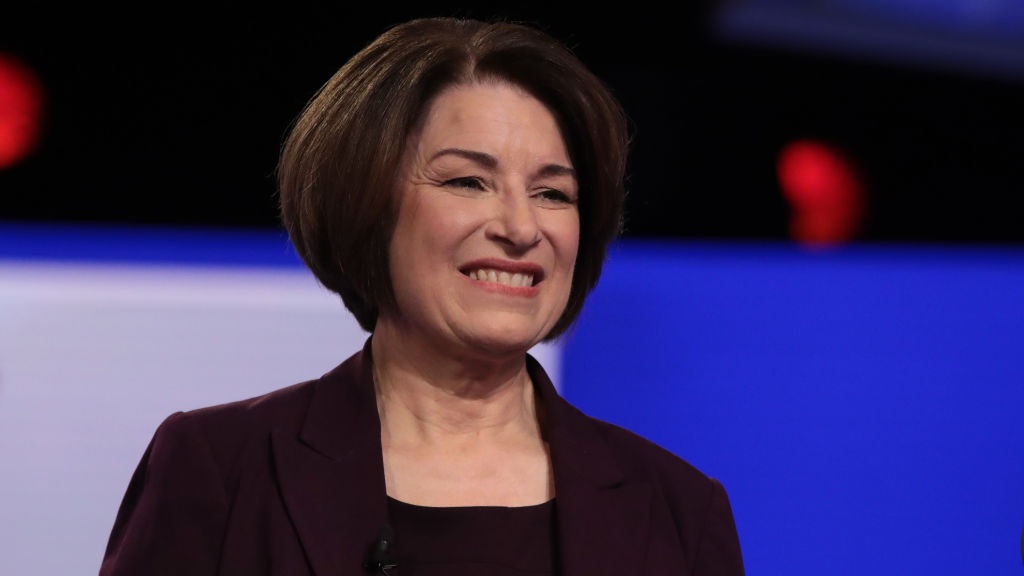In the wake of the killing of George Floyd, U.S. Senator Amy Klobuchar faced criticism for not charging multiple Minnesota officers in multiple killings of civilians during her time as a prosecutor in the state.
Klobuchar was the chief prosecutor of the state’s largest county, Hennepin County, for eight years and did not bring charges for more than 24 cases in which civilians were killed during encounters with the police, according to The Washington Post.
One case was that of Christopher Burns, a 44-year-old Black man who died at the hands of police during a response to a domestic violence call in 2002. His fiancée said officers handcuffed Burns before beating and strangling him, which resulted in a fracture to the cartilage around his throat, according to The Post. He died on the scene in front of his 4-year-old daughter. Police said Burns struggled for several minutes, which led them to perform a sanctioned neck hold. The city of Minneapolis settled a lawsuit against the officers for $300,000.
Burns was the third Black person Minneapolis police officers caused the death of that year, The Post reported. Protesters demanded charges be brought against the two officers involved in Burns’ death, and many expressed anger toward Klobuchar. She declined to charge the officers and deferred to a grand jury, who then let the men go free.
Despite not charging several white officers who'd killed Black Minnesota residents, Klobuchar continuously prosecuted smaller offenses such as vandalism. The then 38-year-old was elected on the platform of guaranteeing “meaningful and, when appropriate, severe” consequences and a zero-tolerance policy on nonviolent crime. Her charges often resulted in longer than usual sentences. She has been criticized for focusing more heavily on these smaller crimes because of the disproportionate effect on minority communities.
“We were already a community in distress when she became Hennepin County attorney,” said Nekima Levy Armstrong, a civil rights attorney and former president of the Minneapolis chapter of the NAACP. “Rather than taking steps to help mitigate some of those concerns and issues, during her tenure in office, her policies exacerbated the situation.”
While Klobuchar stated that the rate of African American male imprisonment declined by 13% under her leadership, Jasmine Heiss, director of outreach with the Vera Institute of Justice which Klobuchar cited, said the numbers reflect that of a bigger trend throughout the state.
“Hennepin County overall — both during Amy Klobuchar’s tenure and subsequently — has not meaningfully addressed the shocking racial disparities in the local justice system,” Heiss said.
During her run for Democratic presidential nominee, Klobuchar supported studying reparations for Black people, according to Politico. But families of the victims of police brutality under the senator do not believe she is truly focused on helping Black people.
“If she cared about Black lives, she would already be engaged and advocating for change,” Monique Cullars-Doty, whose nephew was killed by police officers in St. Paul in 2015, told The Post.
In response to allegations that she once had an opportunity to prosecute officer Derek Chauvin, the officer who killed Floyd, Klobuchar said she had no involvement, a statement which her career's timeline supports.
"This idea that I somehow declined a case, which has been reported on some news blogs … against this officer is absolutely false. It is a lie. I don’t know what else to say about it, than it is a lie," Klobuchar said according to the Hill. "The case was investigated. … That investigation continued into a time where I was already sworn into the U.S. Senate."
Back in 2006, Chauvin was one of several officers involved in the fatal shooting of a man who had stabbed multiple people before turning to police, reports The Guardian. According to a statement by current Hennepin County District Attorney Mike Freeman, “all prosecutorial decisions were made under the direction of Freeman,” because Klobuchar had already transitioned to the Senate at the time of the case's prosecution, reports Daily Beast.
Correction: An earlier version of this article incorrectly stated Klobuchar once declined to prosecute officer Derek Chauvin.
